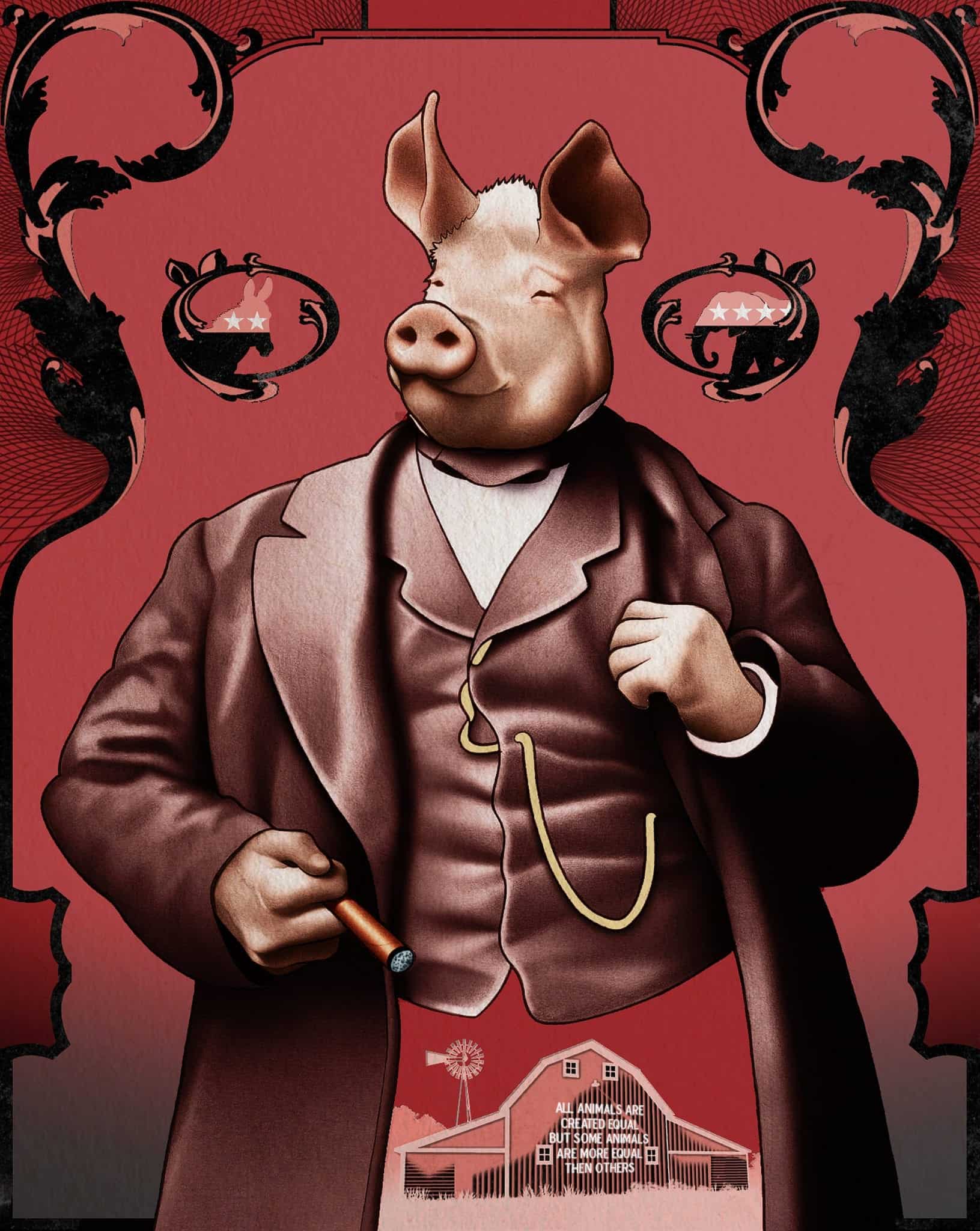Why Animal Farm still matters

Author: bodie robinson| A & C Writer
Our A&C writer takes you back to high school, but not really.
In a 2014 article regarding Edmund Burke’s letter, Reflections on the Revolution in France, Christopher Hitchens wrote, “the tremendous power of the Reflections lies in this, the first serious argument that revolutions devour their own children and turn into their own opposites.” Burke’s Reflections was a counterrevolutionary document that decried the French Revolution—both in its methods and its goals. Among the most prescient passages in Burke’s letter is his prediction of the rise of a charismatic and dictatorial military general. Burke writes that the revolutionary insurrections in France, beginning with the storming of the Bastille in July 1789 in Paris, would culminate in a power vacuum—ripening conditions for a military dictatorship. And, of course, Burke was right. The charismatic martial dictator that he envisaged would become Napoleon Bonaparte.
Hitchens dubbed Burke a “reactionary prophet.” But however prophetic Burke’s Reflections are, today the letter remains hardly anything more than anachronistic ramblings against a progressive revolution whose ideals, more or less, now dominate most of the Western world. At best, Burke’s letter is a quaint curiosity in the history of political thought. George Orwell’s novella, Animal Farm, on the other hand, delivers a critique of revolutionary politics that is both leftist (Orwell declared himself a “democratic socialist”) and still pertinent.
I won’t belabour the plot of the book, because I assume that many readers are already familiar enough with Animal Farm. But what must be understood is the following: Animal Farm is a critique of the Soviet Union, its ideology, Marxism-Leninism, its callous authoritarianism both domestic and foreign, and the cult of personality, which developed around Joseph Stalin.
Orwell’s critique is developed through an allegory. The story is set on a modest farm in England owned by a lazy, alcoholic farmer, Mr. Jones. The animals on the farm, led by a vanguard of pigs, gain class-consciousness and remove Mr. Jones from the farm. The animals adhere to a revolutionary theory called Animalism. Animalism argues that humanity is a parasitic ruling class that exploits the labour of farm animals in order to maintain their own gluttonous lifestyles. In short, the animals have their labour heavily exploited by humans. And in exchange for their labour, humans provide the animals with the basic means of subsistence: a steeple over their heads and food in their troughs. The animals decide that they no longer require humans to organize themselves and that they are entitled to the whole value of their labour, as opposed to allowing humans extract most of the fruits of animal labour. The result is a coup, and the animals forcibly remove Mr. Jones. The Animalist revolution purports to have freed all the farm animals from Mr. Jones’ oppressive fetters. Sound familiar?
Once the animals take control of Mr. Jones’ farm and successfully defend it against a human counterrevolution – called The Battle of the Cowshed – the animals begin to implement their Animalist economic and social policies. The pigs, the most intelligent of the animals, quickly establish themselves as a bureaucratic class on the animal farm. The revolutionary theory of Animalism is simplified into seven commandments. Since many of the animals can’t read, the commandments are simplified and compacted into two supreme maxims: “four legs good, two legs bad,” and “all animals are equal.” The sheep are especially prone to excitement by these slogans and they repeat them constantly. Throughout the duration of the Animalist regime, power becomes more and more concentrated into the pigs’ bureaucracy, until the entire farm is under the control of one pig alone – his name is Napoleon. This should sound familiar.
After many years have passed since the Animalist revolution, Napoleon and his bureaucracy of pigs impose the same harshness of labour on animals that the humans – the original oppressors – did. The pigs receive special treatment. They live in Mr. Jones’ farmhouse, drink alcohol, eat rich foods off of fancy human silverware. The state of animal farm becomes indistinguishable from the conditions that the human regime subjected them to. Indeed, the pigs themselves begin to resemble their former masters. Napoleon starts wearing a bowler hat, wields a bullwhip, and, along with the rest of the pigs, walks on his hind legs. This results in a slight alteration of Animalism’s two fundamental maxims, which the sheep shout enthusiastically: “four legs good, two legs better,” and “all animals are equal, but some animals are more equal than others.”
The tremendous power of Animal Farm therefore lies in this, Orwell’s correct assessment of the Soviet Union as an authoritarian regime which, by threats external but especially internal, would inevitably collapse in on itself and begin to resemble nothing that it originally claimed itself to be. The history of the twentieth century is a testament to Orwell’s lesson in Animal Farm: Marxism-Leninism simply didn’t work. And the relevance of Orwell’s allegory still persists, especially for those of us on the left who struggle with the question of socialism. What went wrong? Was it a practical issue or a theoretical one? Can it be corrected? And if so, what is to be done?










